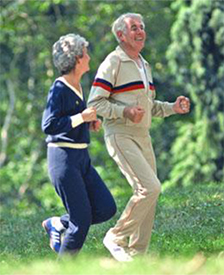Exercise - Fitness
Can exercise improve my heart health?

Regular exercise is very important to maintain good health. Even people with known cardiovascular disease can benefit from a regular exercise program. Always talk to your physician before starting an exercise program to receive advice on how to get started. You can discuss what type of exercise is best for you, and how much exercise you should get. It is never too late to enjoy the benefits of regular exercise.
What are the benefits of regular exercise?
- Improves cardiovascular fitness.
- Burns calories.
- Improves lung function.
- Strengthens bones and tones muscles.
- Lowers blood pressure and cholesterol.
- Helps control diabetes or may lessen the risk of getting this disease.
- May improve sleep.
- Reduces stress.
- Can improve sense of well-being.
- Exercises such as walking require no special equipment or skills.
How to begin a walking program?
Walking is one of the easiest exercise programs you can do. All you need is comfortable clothes, a good pair of walking shoes and the desire to live well. You can begin a walking program by walking as few as 10 minutes a day, three to four days a week. After a week or so, see if you can increase your walking time by five minutes. Continue to add minutes and days until you are able to walk at least 30 minutes, most days of the week.

Remember to stretch before you begin your walk. Start out walking slowly, then, begin to increase your walking speed to increase your heart rate. Your breathing should be increased but you should still be able to carry on a conversation as you walk. Be sure to stand tall as you walk with your head up and eyes facing forward. Shoulders should be down, back and relaxed. At the end of your walk, begin to decrease your speed to allow your body to cool down. Finish with a few stretches.
To stay motivated, consider finding a walking partner. However, you may enjoy the peace and quiet of walking alone. Many walkers wear headphones so that they can listen to music or a book on tape. If you wear headphones as you walk, be sure to be alert for cars and other sounds that may be muffled by the headphones. Vary your walking route to keep it interesting and if possible, identify an indoor walking route (like a local mall) for bad weather days. Using a pedometer to count your steps can also help you measure your progress. For optimal health, the American Heart Association recommends that you walk 10,000 steps per day.